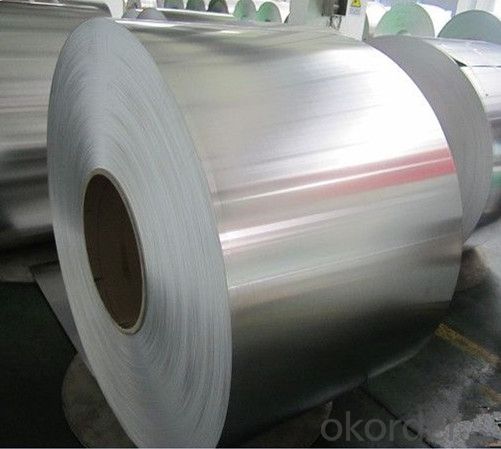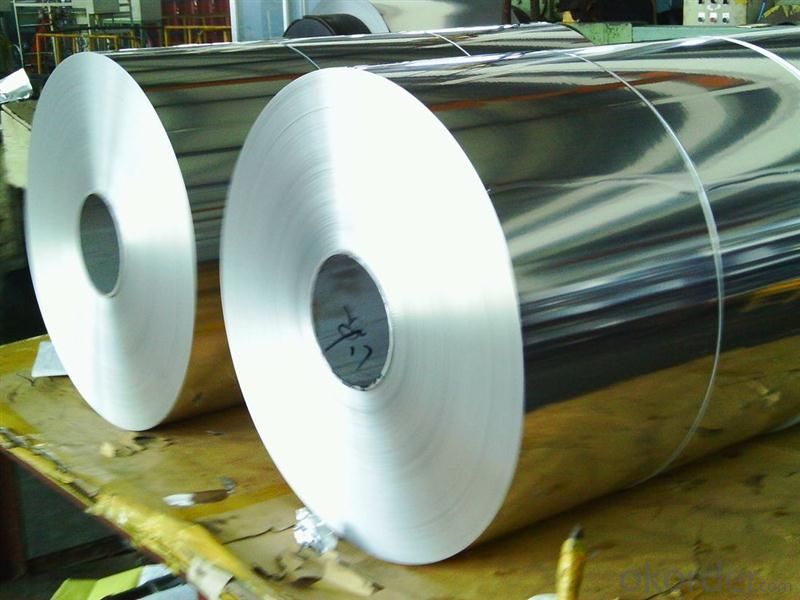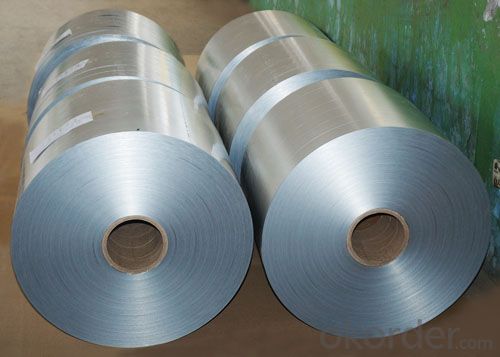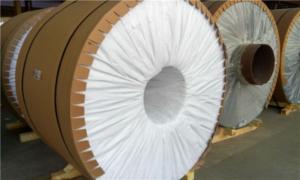1100 3003 Mirror Insulation Aluminum Roll
- Loading Port:
- Shanghai
- Payment Terms:
- TT OR LC
- Min Order Qty:
- 5 m.t.
- Supply Capability:
- 6000 m.t./month
OKorder Service Pledge
OKorder Financial Service
You Might Also Like
Item specifice
1100 3003 Mirror Insulation Aluminum Roll
Applications:
Aluminum foil roll is widely used in construction,decoration,hardware,
electric appliances,machinery and other industrial and civil purposes,
such as electronic capacitor,composite cooker,rice cooker,refrigerator,
computer casting,telecommunication,equipment,lamp shade,air conditioner,
cosmetics cover and so on.
Or it can be made as customers’ requirement.
Specifications
color aluminum coil
1000 series 1100 10160 1200
surface could be: Brushed, drawing, embossed, printing
color: red,
color aluminum coil
.Alloy type: 1050/1060/1100/1350
2.Temper: H16, H18, H22, H24
3.Thickness range: 0.1mm-4mm
4.Width range: 25mm-1600mm
5.Surface:finish: bright & smooth surface, without flow lines, slight oiled to avoid white rusting.
6.Quality material:totally free from such defefects as roll marks, edge damager, camber, white rust, oil patches, holes, break lines,
color aluminum coil
Name |
color aluminum coil |
Alloy or not | yes |
Alloy | 1100H16/18, 3003H24,3003H26,3005H26,8011,3004,3105,5005,etc. |
Thickness | 0.1-4mm |
Width | ≤1600mm |
MOQ | 5T |
Coating finish | Brushed, drawing, embossed, printing |
Color | As to code RAL |
Surface | Embossed,Mill Finish,Coated,Brushed |
Gloss | 10-90%(EN ISO-2813:1994) |
Total coating thick | PVDF27 ~35micron |
Polyester18~27micron(EN ISO-2360:1995) | |
Coating hardness | 2H |
Adhesion | 5B (EN ISO-2409:1994) |
Impact resistance | No cracking and peeling (A.S.T.M D2794-1993) |
Flexibility (T-bend) | 0T- 2T |
MEK resistance | 100 |
Certification | ISO9001:2000, CE, SGS |
Coil's standard diameter | 1100mm |
Inner Diameter | 405mm/505mm |
Coil's standard weight | 2000kgs |



- Q:Can aluminum coils be used in the production of aluminum garage doors?
- Aluminum garage doors can indeed incorporate aluminum coils. Due to its lightweight nature, durability, and resistance to corrosion, aluminum is widely favored as a material for garage doors. Typically, aluminum coils are employed to fabricate the panels and frames of these doors. These coils can be effortlessly molded and manipulated into the desired garage door design. Moreover, aluminum coils can be powder coated or painted to impart a polished appearance and enhance the visual appeal of the garage door. In conclusion, aluminum coils are a flexible and pragmatic option for the manufacturing of aluminum garage doors.
- Q:Can aluminum coils be used in the production of air conditioning systems?
- Yes, aluminum coils can be used in the production of air conditioning systems. Aluminum is a popular choice for coils due to its excellent heat transfer properties, lightweight nature, and resistance to corrosion. It allows for efficient heat exchange, making it a suitable material for air conditioning systems.
- Q:What are the different surface treatments applied to aluminum coils?
- Aluminum coils can undergo various surface treatments to enhance their appearance, protect against corrosion, and improve performance. Some commonly used surface treatments for aluminum coils are: 1. Anodizing: By subjecting aluminum to an electrochemical process, an oxide layer is formed on the surface, boosting corrosion resistance and providing an attractive finish. Anodized aluminum coils are available in a wide range of colors and finishes. 2. Painting: Paint is applied to the surface of aluminum coils, offering a decorative finish and added corrosion resistance. Painted aluminum coils find frequent use in architectural applications where aesthetics are crucial. 3. Laminating: A protective film is applied to the surface of aluminum coils, forming a barrier against scratches, abrasion, and UV radiation. Laminated aluminum coils are commonly employed in applications that require durability and weather resistance. 4. Polishing: Aluminum coils are buffed to create a smooth and shiny finish, enhancing appearance and corrosion resistance. Polished aluminum coils are often used for decorative purposes, providing a luxurious appearance. 5. Brushing: Aluminum coils undergo a mechanical process to create fine parallel lines on the surface, resulting in a brushed or satin finish that can hide imperfections and scratches. Brushed aluminum coils are often chosen for applications that require a modern and sleek appearance. Ultimately, the selection of a surface treatment for aluminum coils depends on specific application requirements and desired aesthetics. Each treatment offers unique advantages in terms of appearance, corrosion resistance, and durability, enabling manufacturers and designers to choose the most suitable option for their needs.
- Q:What is the average lifespan of aluminum coils?
- The lifespan of aluminum coils can differ based on a range of factors, including the quality of the aluminum, the environmental conditions they are subjected to, and the level of maintenance they receive. On average, aluminum coils typically endure for approximately 15 to 20 years. However, by implementing proper installation procedures, conducting regular cleaning, and performing maintenance tasks, the lifespan of aluminum coils can be extended further. It is vital to emphasize the significance of regular inspections and upkeep in order to enhance the longevity of aluminum coils and guarantee optimal performance.
- Q:Are there any certifications or standards for aluminum coils?
- Yes, there are various certifications and standards for aluminum coils. Some notable ones include the ASTM International standards, such as ASTM B209 for aluminum and aluminum-alloy sheet and plate, and ASTM B221 for aluminum-alloy extruded bars, rods, wire, profiles, and tubes. Additionally, the Aluminum Association provides industry guidelines and certifications, such as the Aluminum Association Registration for Aluminum Coil Production Facilities. These certifications and standards ensure that aluminum coils meet specific quality, performance, and safety requirements.
- Q:What are the different elongation values of aluminum coils?
- The elongation values of aluminum coils can vary based on the specific alloy and temper of the aluminum. Generally, aluminum coils possess exceptional elongation characteristics, enabling them to undergo stretching or deformation without breaking. To illustrate, the frequently utilized alloy 3003-H14 typically exhibits an elongation value of approximately 20-30%. This implies that the aluminum coil can stretch up to 20-30% of its original length before reaching the point of fracture. Conversely, high-strength alloys such as 7075-T6 possess lower elongation values, typically ranging from 9-13%. These alloys are specifically designed for applications where strength is of utmost importance, albeit at the expense of sacrificing some elongation properties. It is worth noting that elongation values can also be influenced by the processing and treatment methods employed on the aluminum coils. For instance, annealing or heat treatment can enhance the elongation properties of specific alloys. In conclusion, the elongation values of aluminum coils can span from 9% to 30%, depending on the alloy, temper, and processing methods utilized.
- Q:I need to write as many interesting facts as i can about aluminum for a thing for school, any help?
- Aluminum, Motorcycle engine aluminum radiator made by precise die casting
- Q:The heat of fusion of aluminum is 3.95kj/g. What is the molar heat of fusion of aluminum? What quantity of energy is needed to melt 10.0g of aluminum? What quantity of energy is required to melt 10.0 mol of aluminum? Three questions i need help with can someone show me step by step please so i can get it thank you a bunch
- Heat Of Fusion Of Aluminum
- Q:how tall is a crushed aluminium soda can compared to a non crushed one.i need measurements in centimeters please.ALSO!! AN IMAGE that actually has both of the two with the measurements would be SUPER HELPFUL
- I recognize that there are places in this world where aluminum beverage cans are very exotic, very rare, and may even be quite expensive. I can also understand that, in such a special place, one may have never actually held one of these objects in your own hands. If you live in such a place, then I can understand why you need to seek assistance on Yahoo Answers. I am, personally, quite surprised that you would have internet access in such a place. For your answer... it depends on how you crush the can but it is quite possible to crush your standard aluminum beverage can to a thickness of fractions of a centimeter.
- Q:How do aluminum coils compare to iron coils in terms of weight?
- Aluminum coils are significantly lighter than iron coils.
1. Manufacturer Overview |
|
|---|---|
| Location | |
| Year Established | |
| Annual Output Value | |
| Main Markets | |
| Company Certifications | |
2. Manufacturer Certificates |
|
|---|---|
| a) Certification Name | |
| Range | |
| Reference | |
| Validity Period | |
3. Manufacturer Capability |
|
|---|---|
| a)Trade Capacity | |
| Nearest Port | |
| Export Percentage | |
| No.of Employees in Trade Department | |
| Language Spoken: | |
| b)Factory Information | |
| Factory Size: | |
| No. of Production Lines | |
| Contract Manufacturing | |
| Product Price Range | |
Send your message to us
1100 3003 Mirror Insulation Aluminum Roll
- Loading Port:
- Shanghai
- Payment Terms:
- TT OR LC
- Min Order Qty:
- 5 m.t.
- Supply Capability:
- 6000 m.t./month
OKorder Service Pledge
OKorder Financial Service
Similar products
New products
Hot products
Hot Searches
Related keywords





























